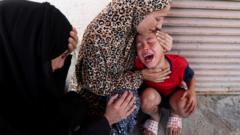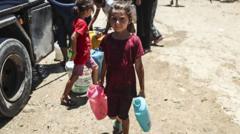A third of community kitchens in Gaza have closed, leading to dire food shortages as the Israeli blockade continues for the third month. In response, the US has proposed a plan to deliver humanitarian aid through private firms, despite the UN’s refusal to cooperate due to concerns that it may "weaponize" aid. US Ambassador Mike Huckabee emphasized that the effort aims to secure aid from being diverted by Hamas, prompting division among international agencies on the appropriateness of this method.
US Plans Private Aid Distribution in Gaza Amid UN Concerns

US Plans Private Aid Distribution in Gaza Amid UN Concerns
US confirms the launch of a private aid delivery system for Gaza as UN warns of potential humanitarian crises.
The United States has officially confirmed plans to establish a new humanitarian aid distribution system for Palestinians in Gaza, aiming to circumvent the ongoing Israeli blockade that has now persisted for three months. The US ambassador to Israel, Mike Huckabee, announced that private companies will help deliver essential supplies such as food and hygiene items to those in need, amidst worsening conditions in the region.
According to reports from the UN, one-third of Gaza's community kitchens, critical suppliers of food to the population, have shut down in recent weeks due to severe shortages of essential ingredients, exacerbated by the blockade. These disruptions come as the UN warns of an imminent humanitarian crisis affecting an estimated 2.1 million residents.
Huckabee affirmed that the proposal involves setting up distribution centers protected by security personnel, with plans to reach over a million people initially. However, he clarified that Israeli forces would only secure the perimeters of these centers, fueling concerns from humanitarian organizations who see the plan as incompatible with established humanitarian principles.
Jens Laerke, spokesperson for the UN's Office for the Coordination of Humanitarian Affairs, stated unequivocally that the UN would not participate in any aid delivery system that diverges from the core principles of humanitarian aid. He noted that the existing UN-operated channels have successfully managed to curb incidents of aid theft, in contrast to the issues the new system purports to address.
Significant price hikes in basic food items have further compounded the urgency of the situation, with reports indicating that a 25kg bag of flour now costs $415, a staggering increase from prices just months ago. The US administration expressed that humanitarian aid is a priority for President Donald Trump, and discussions are underway to secure funding from wealthy Arab Gulf countries in the wake of the proposed initiative.
In conjunction with the aid proposal, the Israeli military has been revamping its strategy, including establishing distribution hubs in southern Gaza and controlling the flow of assistance to ensure that it does not fall into Hamas's hands. However, this strategy faces criticism, particularly from entities concerned that it undermines established humanitarian operations and could manipulate aid to forcefully relocate populations.
As Israeli forces intensify military actions in the region, pressing questions loom about the humanitarian consequences, especially as aid agencies report that 90% of Gaza's population has been displaced multiple times during the conflict. The situation has raised alarms globally, prompting discussions within the UN and other humanitarian bodies regarding the impacts of such control over aid distribution on their neutrality and effectiveness.
Families in northern Gaza are increasingly desperate, with residents expressing their unwillingness to abandon their homes in search of aid, highlighting the fears of further displacement and suffering. The humanitarian crisis in Gaza remains dire, and calls for clarity and action are echoing from various international stakeholders as the situation continues to develop.






















